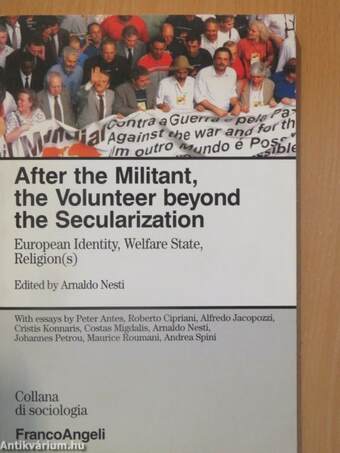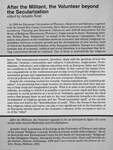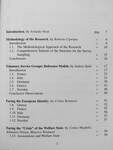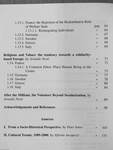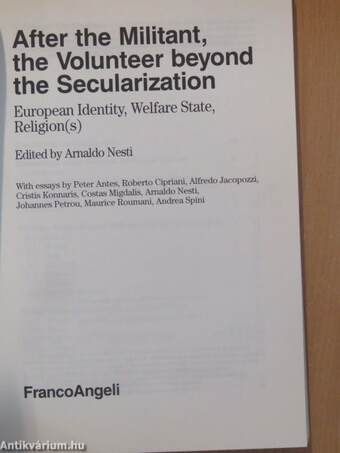1.067.663
kiadvánnyal nyújtjuk Magyarország legnagyobb antikvár könyv-kínálatát

VISSZA
A TETEJÉRE
JAVASLATOKÉszre-
vételek
After the Militant, the Volunteer beyond the Secularization
European Identity, Welfare State, Religion(s)
| Kiadó: | FrancoAngeli s.r.l. |
|---|---|
| Kiadás helye: | Milánó |
| Kiadás éve: | |
| Kötés típusa: | Ragasztott papírkötés |
| Oldalszám: | 159 oldal |
| Sorozatcím: | Collana di sociologia |
| Kötetszám: | |
| Nyelv: | Angol |
| Méret: | 23 cm x 15 cm |
| ISBN: | 88-464-4115-X |
| Megjegyzés: | További szerző a kötetben. |
naponta értesítjük a beérkező friss
kiadványokról
naponta értesítjük a beérkező friss
kiadványokról
Fülszöveg
After the Militant, the Volunteer beyond the Secularization edited by Arnaldo Nesti In 1999 the European Universities of Florence, Hannover and Salonica, together with the Israeli Ben Gurion University (Beer Sheva) and two no-profit cultural associations, Planning and Research (Salonica) and ASFeR-Association for the Study of Religious Phenomena (Florence), began research about "European Identity, Welfare State, Religion(s)" on behalf of the European Commission. The research was placed on the borderline between economic and ethical (religious) rationalities, between economic growth and the development of civic society, both of which are fundamental features of the European tradition. Europe is a complementaiy mix of economic, political and social identities, it is important that its living connections should be explored. One of these is undoubtedly the religious factor. This international research, therefore, deals with the question of how the different Christian communities and... TovábbFülszöveg
After the Militant, the Volunteer beyond the Secularization edited by Arnaldo Nesti In 1999 the European Universities of Florence, Hannover and Salonica, together with the Israeli Ben Gurion University (Beer Sheva) and two no-profit cultural associations, Planning and Research (Salonica) and ASFeR-Association for the Study of Religious Phenomena (Florence), began research about "European Identity, Welfare State, Religion(s)" on behalf of the European Commission. The research was placed on the borderline between economic and ethical (religious) rationalities, between economic growth and the development of civic society, both of which are fundamental features of the European tradition. Europe is a complementaiy mix of economic, political and social identities, it is important that its living connections should be explored. One of these is undoubtedly the religious factor. This international research, therefore, deals with the question of how the different Christian communities and cultures (Catholicism, Anglicanism, Protestantism, Orthodoxy) and religious minorities such as European Islam and Judaism contribute to the debate about social welfare. In this context the inquiry focuses comparatively on the confessional and secular (even if implicitly religious) humanitarian groups and organizations that contribute in fact to the transformation of social policies in Europe, in view of a new european citizenship. Despite the returning tendencies towards "bureaucratization and institutionalization", it is promising that a large number of citizens dedicate their time and money to help weak and marginalized people. What is at stake is the principle of subsidiarity, according to which it is possible to provide a more rapid and less costly response to social problems at a local level. Solidarity appears anyway the ideál source that groups draw on and aim to: the very tendencies towards a de-confessionalization of religious groups and the "Fresh humanistic spell" of the secular ones does not lead to the "desertification of souls". Then, the research has shown that religious values and norms can play a very significant role in the formation of an European identity based on the normative cohesion of the acceptance and care of the "other". After the Militant, the Volunteer appears to be an anticipatory figure of a new social order beyond Modernity and Secularization. Arnaldo Nesti is professor of Sociology at the University of Florence and editor of the journal "Religioni e societá. Rivista di scienze sociali della religione". He alsó directs the new International Center for the Study of Contemporary "Religious" in San Gimignano (Siena). Among his books: Provincialia. Scavi sulVidentüá degli italiani, Firenze, Polistampa, 1999 and Cosa credono quelli che dicono di credere, Roma, Meltemi, 2002. VisszaTémakörök
- Szociológia > Szociálpolitika > Életszínvonal
- Idegennyelv > Idegennyelvű könyvek > Angol > Szociológia > Szociálpolitika > Életszínvonal
- Szociológia > Szakszociológiák
- Szociológia > Szociálpolitika > Szociális munka
- Idegennyelv > Idegennyelvű könyvek > Angol > Szociológia > Szakszociológiák
- Idegennyelv > Idegennyelvű könyvek > Angol > Szociológia > Szociálpolitika > Szociális munka
- Idegennyelv > Idegennyelvű könyvek > Angol > Szociológia > Módszertan > Demográfia
- Szociológia > Módszertan > Demográfia > Egyéb
- Idegennyelv > Idegennyelvű könyvek > Angol > Vallás
- Vallás
- Vallás > Határtudományok



